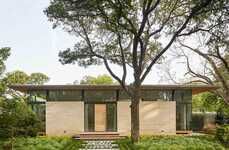This angular community performance space is located in the southern Ota Ward of Tokyo (a predominantly residential neighborhood) and the building was designed by the Japanese studio Ryuichi Sasaki Architecture.
The layout of the space was designed with fluidity and multi-use in mind. The building houses apartments—a total of 13 one-bedroom residential units and a penthouse, as well as a community performance space that brings local residents together in the name of art. Ryuichi Sasaki Architecture, for example, includes a music hall and a small auditorium that can sit 80 people in order to stimulate creativity.
By designing residential complexes with in-built opportunities for communities to gather, architects contribute more to authentic urban cohesion.
Angular Community Spaces
Ryuichi Sasaki Architectur Works on a Community Performance Space
Trend Themes
1. Community Performance Spaces - Creating community performance spaces within residential complexes can contribute to authentic urban cohesion.
2. Multi-use Spaces - Designing multi-use spaces within residential complexes can increase functionality and appeal to a wider audience.
3. Fluid Space Layouts - Designing fluid space layouts can increase the versatility and adaptability of a building.
Industry Implications
1. Real Estate - Developers that create multi-use residential complexes with community performance spaces can differentiate themselves from competitors and increase appeal to community-oriented buyers.
2. Architecture - Architects who design innovative and versatile community spaces can create new market opportunities and increase their reputation for innovative design.
3. Entertainment - Community performance spaces can provide new outlets for local artists and bring together a community around shared interests and experiences.






